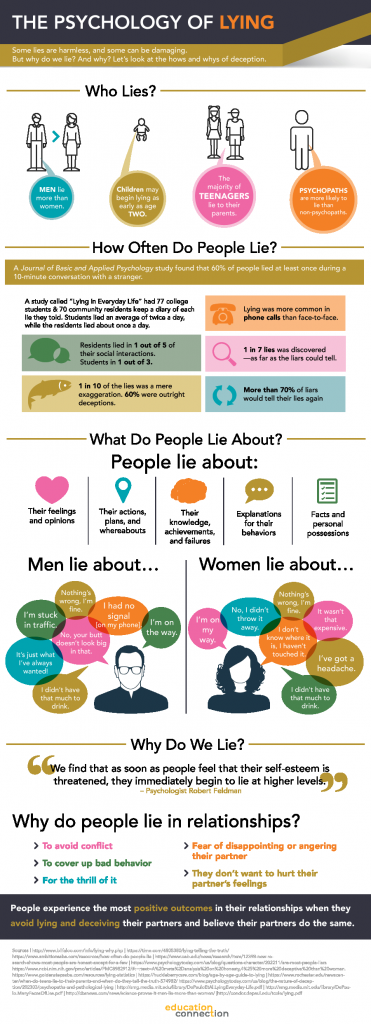Table of Contents
Even the most honest person has probably lied at least once in her or his lifetime. Sometimes lying feels justified and harmless—we call them “little white lies.” Sometimes lying feels necessary in order to keep the peace between a spouse, friend, or family member.

Want to share this image on your site? Just copy and paste the embed code below
But as evident in any headline-making scandal, lies may be damaging and have been known to ruin marriages, friendships, and careers. Let’s examine the psychology behind lying: who lies, what we lie about, and why we lie.
Who Lies?
It’s not necessarily clear from research the prevalence of lying. Some studies show that we all lie, and we lie nearly every day. Others conclude that the majority of people are essentially honest—they don’t lie at all, or they don’t lie all that much.
Studying lying isn’t necessarily easy. Many such studies involve having people keep a diary of when they lie over a certain period of time. But there’s no way to tell whether people are being honest in their self-reporting—and people who lie might lie about whether they do and how often they do it.
However, some general trends have emerged about who lies.
- Men lie more than women: Studies show that men are more likely to lie overall, and also more likely to tell “black”—serious—lies.
- Children may begin lying as early as age two.
- The majority of teenagers lie to their parents.
- Psychopaths are more likely to lie than non-psychopaths
What Do We Lie About?
People lie about all kinds of things, depending on who they are lying to. A common lie that both women and men use is “I’m fine.” But there are some differences between the lies men and women make.
Men have admitted to lying about their whereabouts (“I’m stuck in traffic” / “I’m on the way”), a partner’s appearance (“No, your butt doesn’t look big in that”), and gifts they’ve received (“It’s just what I’ve always wanted!”).
Women also lie about gifts they receive, but also about feeling ill (“I have a headache”) and about finances (“It wasn’t that expensive”). It seems that when a man or woman thinks that the truth will make their partner angry, they lie about what they find to be harmless.
Why We Lie
Psychologist Robert Feldman has spent many years studying lying. His research showed that when people felt their self-esteem was threatening, they began to lie at higher levels.
Feldman also found that women often have different motives for lying than men, observing:
“Women were more likely to lie to make the person they were talking to feel good, while men lied most often to make themselves look better.”
—Psychologist Robert Feldman
People lie in relationships for a number of reasons.
- Fear of disappointing or angering their partner
- To avoid conflict
- To cover up bad behavior
- They don’t want to hurt their partner’s feelings
- For the thrill of it
Keep a lie journal for a week. Write down every lie you tell, who you told it to, and then, delve into the psychology of why you felt compelled to tell it. After that, if you’re hungry for more psychology knowledge, you can search for a psychology program that fits in with your life!
Sources
http://www.blifaloo.com/info/lying-why.php https://time.com/4805380/lying-telling-the-truth/ https://www.ambitionsaba.com/resources/how-often-do-people-lie https://www.uab.edu/news/research/item/12398-new-research-shows-most-people-are-honest-except-for-a-few https://www.psychologytoday.com/us/blog/questions-character/202211/are-most-people-liars https://www.ncbi.nlm.nih.gov/pmc/articles/PMC8982912/#:~:text=A%20meta%2Danalysis%20on%20honesty,4%25%20more%20deceptive%20than%20women. https://www.goldenstepsaba.com/resources/lying-statistics https://huckleberrycare.com/blog/age-by-age-guide-to-lying https://www.rochester.edu/newscenter/when-do-teens-lie-to-their-parents-and-when-do-they-tell-the-truth-574982/ https://www.psychologytoday.com/us/blog/the-nature-of-deception/202303/psychopaths-and-pathological-lying http://smg.media.mit.edu/library/DePauloEtAl.LyingEveryday-Life.pdf http://smg.media.mit.edu/library/DePaulo.ManyFacesOfLies.pdf http://cbsnews.com/news/science-proves-it-men-lie-more-than-women/ http://condor.depaul.edu/tcole/lying.pdf

